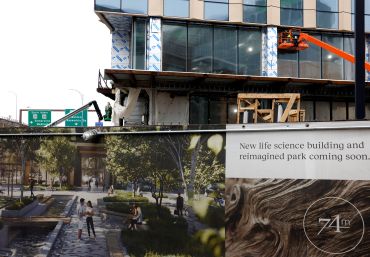It’s Not Just AI — Space and Climate Are Driving California’s Office Market

The boom in artificial intelligence and the growth of companies like OpenAI are helping key California office markets bounce back from some of the toughest years in recent history.
However, just as Silicon Valley extends far beyond the giants like Apple, Google (GOOGL) and Meta, the resurgence isn’t solely propelled by AI. The emerging industries focused on space and climate economies are writing a new chapter in California’s long-standing history as the pinnacle of global innovation, and boosting its bruised real estate market with it.
Aerospace, for one, has long been a part of California’s prosperity, and a dramatic jump in interest in the space economy signals a promising future for the state’s commercial real estate sector.
The space economy has grown from $280 billion in 2010 to more than $447 billion in 2023. Experts agree we’re only getting started, with data showing space-related investments rocketing to $1 trillion by 2030. California has drawn approximately half of the nation’s space tech investment capital over the past 11 years, and secured over 85 percent of the total capital invested in space-related companies across the U.S. in 2021 alone.
And while traditional office assets continue to slog through an anemic market, advanced R&D space in California could be on the brink of a major boom — all thanks to this reinvigorated interest in space travel and exploration stemming from a modern-day space race led by Jeff Bezos, Elon Musk and NASA.

This activity is driving a marked increase in demand for highly specialized spaces designed and built specifically for the needs of the aerospace industry. This upswing can be likened to the surge in interest in lab and R&D space following the life sciences expansion of the past five years. Led by venture capital investments, demand for specialized office and lab space across nine major markets grew by 48 percent, or 59 million square feet, to meet the hyper-specific needs of the biotech and life sciences research sector.
Coupled with companies’ desires to be among the well-known players already in California like NASA, Lockheed Martin, SpaceX and Northrop Grumman, this increase in demand is giving way to the birth of space-focused projects throughout the state, all poised to move on this opportunity. One of these projects is Berkeley Space Center at NASA Research Park, a $2 billion endeavor at Moffett Field in Silicon Valley.
Despite being fully occupied, existing facilities at Moffett Field regularly receive inquiries from would-be tenants. Since its official launch, Berkeley Space Center has received numerous expressions of tenant interest. In Southern California, a cluster of aerospace companies that include Ampaire, Astrolab and Launcher have emerged around SpaceX’s Hawthorne offices. This is the latest iteration of a cycle where companies physically cluster around key players. Clearly, there’s something to be said about being among the greats.
The climate technology industry is also poised for immense growth in California, with climate action top of mind at both a federal and state level.
U.S. lawmakers are taking unprecedented steps with legislation like the Inflation Reduction Act, the most significant climate policy in U.S. history. At the state level, California’s $54 billion climate budget is setting the pace globally as both a historic investment and a roadmap to solve the climate crisis.
California is home to many of the companies involved in fixing the crisis. From startups to investment firms and established entities working on technological innovation, the state is a hotbed for change-makers — all needing physical space to work. According to Deloitte, “California is the leader in hosting climate tech company headquarters and garnering funding. That position mirrors the state’s entrepreneurial lead, as home to 15 percent of U.S. companies and the destination for 44 percent of U.S. venture funding since 2000.”
9zero, a climate-focused investment firm, leased space in San Francisco’s Financial District. The deal made national headlines last fall because of its significance in an office market written off since the start of the pandemic. Congruent Ventures, a San Francisco-based climate and sustainability venture firm, closed its third flagship fund at $275 million in December. The company also says it has invested in 53 climate tech companies to date. Another California-based startup, Watershed, announced in February that it had raised $100 million for its emissions-tracking software.
A commitment to innovation has made the Golden State shine for generations, and this promise continues to drive industries across the board. As investment and activity build across cutting-edge industries other than AI, they too should receive a share of the fame in writing California’s latest chapter as the pinnacle of the global innovation landscape.
Tim Smith is director of development and project management at investor and developer SKS Partners.


